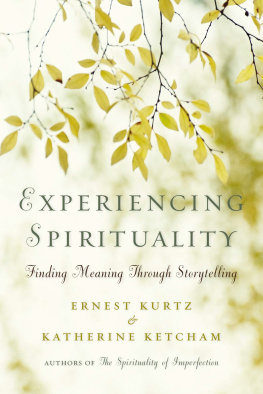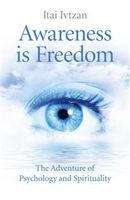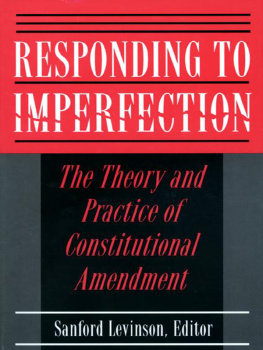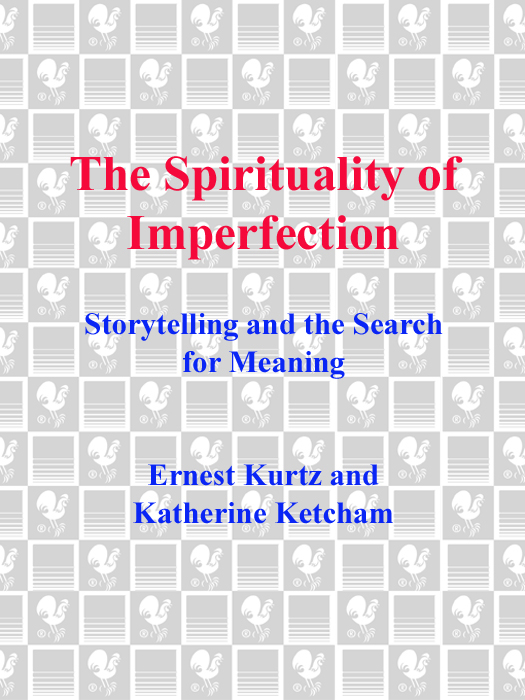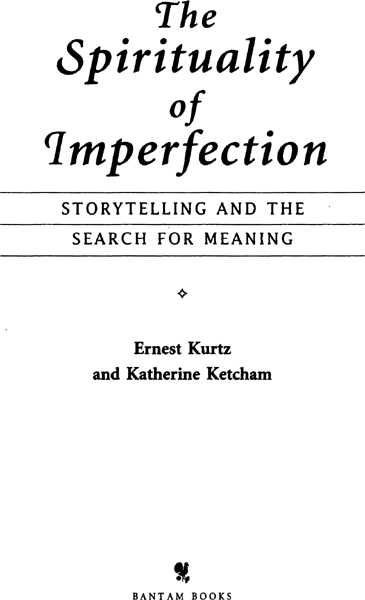To all who have, over the years, told us stories but most of all to Richard Quinn, Robert MacNamara, Marvin Becker, Loren Baritz, Frank Freidel, Oscar Handlin, and William R. Hutchison, who taught us that history is the greatest story.
I think this book comes closer to the real meaning of spirituality than anything Ive looked at in the last twenty years.
A brilliant anthology of wisdom stories from all the great traditions centered around a most compelling and discerning issue.
M. Scott Peck, author of The Road Less Traveled
Filled with the fruits of compassionate wisdom, this book is a heartfelt understanding of our humanity that awakens and heals.
The stories you tell may save someones life. The Spirituality of Imperfection is aimed at anyone interested in an age-old tradition of spiritual literature that asks the hard questions of the human condition.

CONTENTS


Part One
1
2
3
4
5
6
Part Two
7
8
9
10
Part Three
11
12
13
14
15
16
A NOTE TO THE READER

This book retells over one hundred stories. These storiesthe stories that tell spiritualitys storycame to us first by hearing. Some stories we first heard in school, or in church; some were told by a loved grandparent or a favorite aunt or uncle; and others, as we grew older, were shared by friends or acquaintances. In the process of researching those storiesexploring sources, examining different versions, looking for ways of making them more available to our readerswe came across a few new anecdotes, but the majority of the tales we re-tell have their first source in memories memories of hearing that awaken yet other memories of living.
Some readers, with different memories, will recall different renderings of some of these stories; there are many favorite tellings of any tale. But, in truth, there are no new stories. Stories become new to us when something in our own experience makes us ready to hear them. Story-listening requires a childlike wisdom that combines innocence and experience, and no one can be both innocent and experienced in the presence of every story. And so not every reader will get every story, at least not right away. Story, like the spirituality that it conveys, cannot be commanded or forced; it must float loosely within its vehicle, the better to lodge in each hearers individual spirit.
One spiritual teacher cautions: If you respect your listeners enough to tell the story, respect them enough to let them draw their own conclusions. And another master began one of his books with a story that consoles anyone who must confront the impossibility of explaining story:
A disciple once complained, You tell us stories, but you never reveal their meaning to us.
Said the master, How would you like it if someone offered you fruit and chewed it up before giving it to you?
No one can find your meaning for you.
Not even the master.
The notes on sources and related comments generally appear in the back of the book. The first quotation here is from William R. White, Speaking in Stories (Minneapolis: Augsburg, 1982), the final story in the Introduction is adapted from Anthony de Mello, The Song of the Bird (New York: Doubleday-Image, 1982).
An Introduction
THE STORY OF SPIRITUALITY

Baseball teaches us, or has taught most of us, how to deal with failure. We learn at a very young age that failure is the norm in baseball and, precisely because we have failed, we hold in high regard those who fail less oftenthose who hit safely in one out of three chances and become star players. I also find it fascinating that baseball, alone in sport, considers errors to be part of the game, part of its rigorous truth.
Francis T. Vincent, Jr.,
Commissioner of Baseball
Baseball, as its Commissioner points out, teaches that errors are part of the game and perfection is an impossible goal. Because his thought fits as perfectly as possible the theme of this book, we offer this revision of Mr. Vincents insight:
Spirituality teaches us, or has taught most of us, how to deal with failure. We learn at a very young age that failure is the norm in life errors are part of the game, part of its rigorous truth.
Discovering spirituality in the game of baseball is not so strange as it sounds. For literally thousands of years, sages and saints have explored the ordinary and everyday in the attempt to understand the extraordinary and divine. The ritual of the Japanese tea ceremonysimply carrying and serving teais a profound spiritual exercise. The posture of kneeling in prayer conveys acceptance and mindfulness. Standing up in a crowded room and saying, My name is John, and Im an alcoholic, calls forth the spiritual realities of humility, gratitude, tolerance, and forgiveness.
Spirituality takes many forms, and all spiritualities do not look on failure and imperfection in the same way. But through the centuries a recurring spiritual theme has emerged, one that is more sensitive to earthly concerns than to heavenly hopes. This spiritualitythe spirituality of imperfectionis thousands of years old. And yet it is timeless, eternal, and ongoing, for it is concerned with what in the human being is irrevocable and immutable: the essential imperfection, the basic and inherent flaws of being human. Errors, of course, are part of the game. They are part of our truth as human beings. To deny our errors is to deny ourself, for to be human is to be imperfect, somehow error-prone. To be human is to ask unanswerable questions, but to persist in asking them, to be broken and ache for wholeness, to hurt and to try to find a way to healing through the hurt. To be human is to embody a paradox, for according to that ancient vision, we are less than the gods, more than the beasts, yet somehow also both.
We are not everything, but neither are we nothing. Spirituality is discovered in that space between paradoxs extremes, for there we confront our helplessness and powerlessness, our woundedness. In seeking to understand our limitations, we seek not only an easing of our pain but an understanding of what it means to hurt


